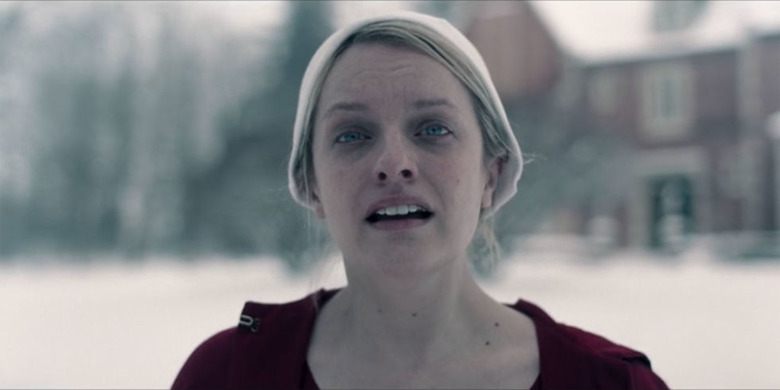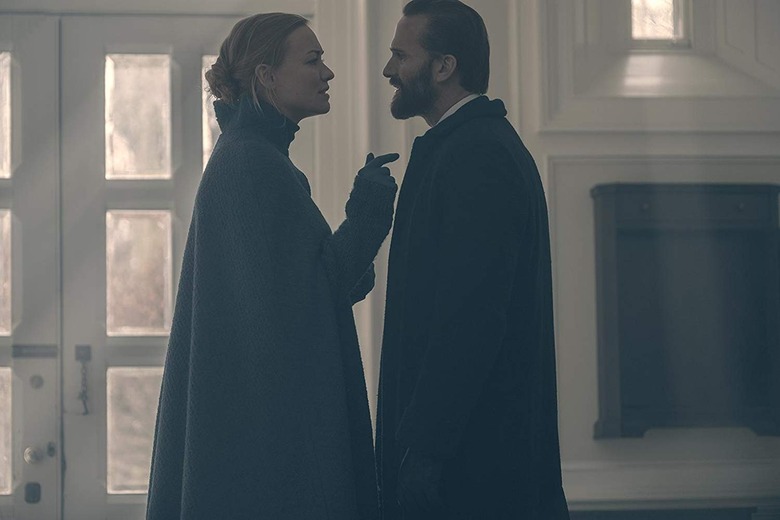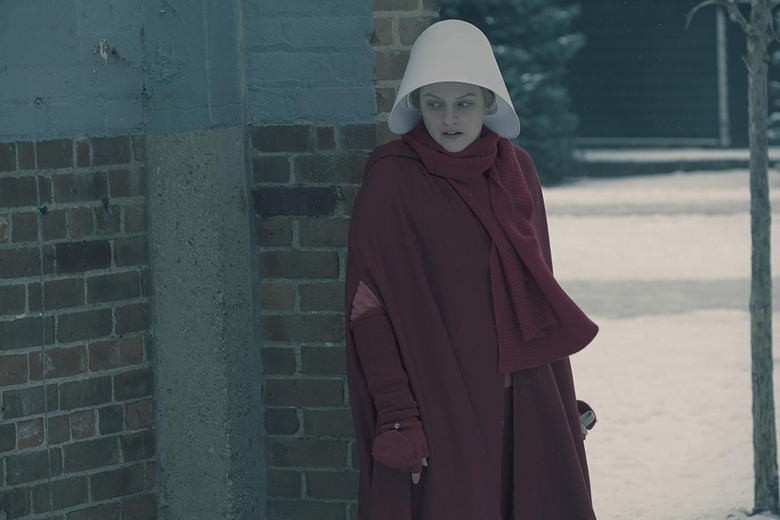Elisabeth Moss Just Gave An Explosive, Emmy-Worthy Showcase In This Week's 'The Handmaid's Tale'
(We're going to kickstart our weekly The Handmaid's Tale review by answering one simple question: Who suffered the most?)
As bleak as this show has gotten, The Handmaid's Tale will always remind us how impeccably filmed it is, and how stupendously acted. And "Holly" really is the epitome of that. "Holly" is an incredible showcase for Elisabeth Moss (who will definitely submit this one for Emmy consideration) and a realization of what The Handmaid's Tale can be when it's not aggressively throwing dreary imagery at us every few minutes.
Who Suffered the Most? June
"I'm sorry there's so much pain in this story," June apologizes to an unseen person at the beginning of episode. "I'm sorry it's in fragments like a body caught in a crossfire...but there's nothing I can do to change it. I tried to put some of the good parts in as well." What a way to begin a harrowing story of survival, an episode that marries The Grey and Where the Heart Is. There's even an ever-present wolf that appears sporadically to remind June of the danger she's in..or perhaps to goad her about her chance for freedom.
"Holly" switches back and forth between June's hopeless situation in the present day, as she experiences severe labor pains while trying to find a way to flee the mansion in the middle of nowhere. While it's a structure we're familiar with in The Handmaid's Tale, "Holly" is a taut, self-contained bottle episode that hones in on June as she contends with internal and external obstacles. I say this every other episode, But "Holly" is a dynamite showcase for Moss, who will likely garner her second Emmy nomination for this episode. Panic, fear, and desperation all flit across Moss' face like within seconds, and she proves that she's not only a fantastic interior actor but that she has potential to be an action flick (or at least zombie apocalypse) leading lady.
A Lone Wolf
"Holly" picks up immediately after the events of last week's episode, with a panic-stricken June attempting to chase the disappearing Guardian cars before realizing it's fruitless. But her desperation doesn't last long, when June spots a garage where a car is parked, encouraging her to regroup and set her sights on escape. But she soon freezes when she sees a black wolf watching her nearby, a sight she'll become used to over the course of the next hour.
"Holly" plays out like a survival flick, with June frantically searching the house for the keys to the garage and car — only pausing to stare longingly at a picture on the mantle of Hannah with her new family. She soon finds herself in possession of the keys and a backpack full of pantry food, and with a summer sports car that she miraculously gets running. But despite a hopeful start (complete with a radio bulletin she tunes into encouraging all American refugees), June soon finds herself facing her most insurmountable obstacle: the garage door. The summer mansion has had all of its power cut off and, unable to open the door, June tries ramming the car instead. Her efforts are wasted, as she screams in pain and frustration, the ever-present wolf silently watching as June realizes in horror that her water has broke.
Taking Aim
To make matters worse, the Waterfords arrive just as June has taken refuge upstairs. Serena (Yvonne Strahovski) is livid, cursing at Fred (Joseph Fiennes) and regaining her steely personality from before her beating. And with Serena back to her old self, Fred snaps back to his weak-willed self, deflecting and pushing the blame of June's rape onto Serena.
As the two of them fight — Serena finally unloading all her frustrations at giving up everything for Fred's cause while he failed to give her the baby she wanted — June creeps through the top floor where she finds a shotgun. Slowly loading and aiming it at the Waterford's, June finds herself pausing, allowing the two of them to move out of her sight. June cries and breathes a sigh of relief when she sees them leave, but then immediately goes into labor.
Building herself a fire in the living room, June passes out in her pile of blankets on the floor, fading into her memory of giving birth to Hannah. Though embedded in pain, it's a happy memory, with Luke and Moira fretting over her and arguing over their separate playlists, Luke eventually winning out only for June to scream "I hate this son—." June wakes from her rosy memory to find herself drenched in blood. Despondently looking at the fire, June takes the rifle and shoots it into the air outside, turning the former symbol of her freedom into a symbol of her imprisonment once more.
Snow White Rose Red
"I keep on going with this limping and mutilated story because I want you to hear it."
Perhaps what sets this episode apart from other flashback-heavy episodes is the nimble interplay between past and present. The Handmaid's Tale had never shown a real cohesion between its flashbacks and the modern-day action, often going for maximum drama rather than a real theme, but past and present fuse seamlessly in "Holly." It's non-linear storytelling at its finest, on the level of the best episodes of Lost. And Moss provides a fantastic constant.
Cherry Jones makes a short but sweet return as June's mom, who tries to convince a skeptical June of the benefits of natural birthing centers. But though her scenes are brief, the fraught relationship between mother and daughter remains and becomes a core part of the episode. That's because the titular Holly is June's mom, who, despite constantly disappointing her daughter, arrives in the nick of time to see June give birth to Hannah. In that moment, all animosity is forgotten, and June happily lets her mother hold her baby. It's a rosy memory that stands in stark contrast to June's modern-day labor, which plays in exact parallel. In the isolated mansion, June has shed all her clothes and attempts to give birth alone, heaving and screaming in a visceral and wild scene. Time becomes fluid in a breathless sequence that sees June flashing back to Hannah's birth, then to the Red Center, then to Janine giving birth, all the while Lydia and the Handmaid's chant "breathe, breathe, breath, push, push, push."
The strength of this episode lies in the story. For the first time, June is telling the story to her living and unborn daughters. It's an episode anchored in emotion and love, which is where The Handmaid's Tale should excel — not by delivering nihilistic diatribes, but by reminding us why June keeps surviving. "By telling this story, I will you into existence. I tell, therefore you are," June whispers to her newborn daughter, who she names Holly. And just then, a car pull up outside the house.
Tale Tidbits




